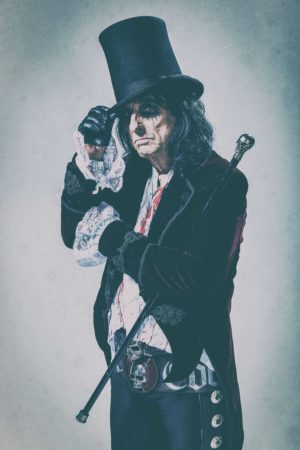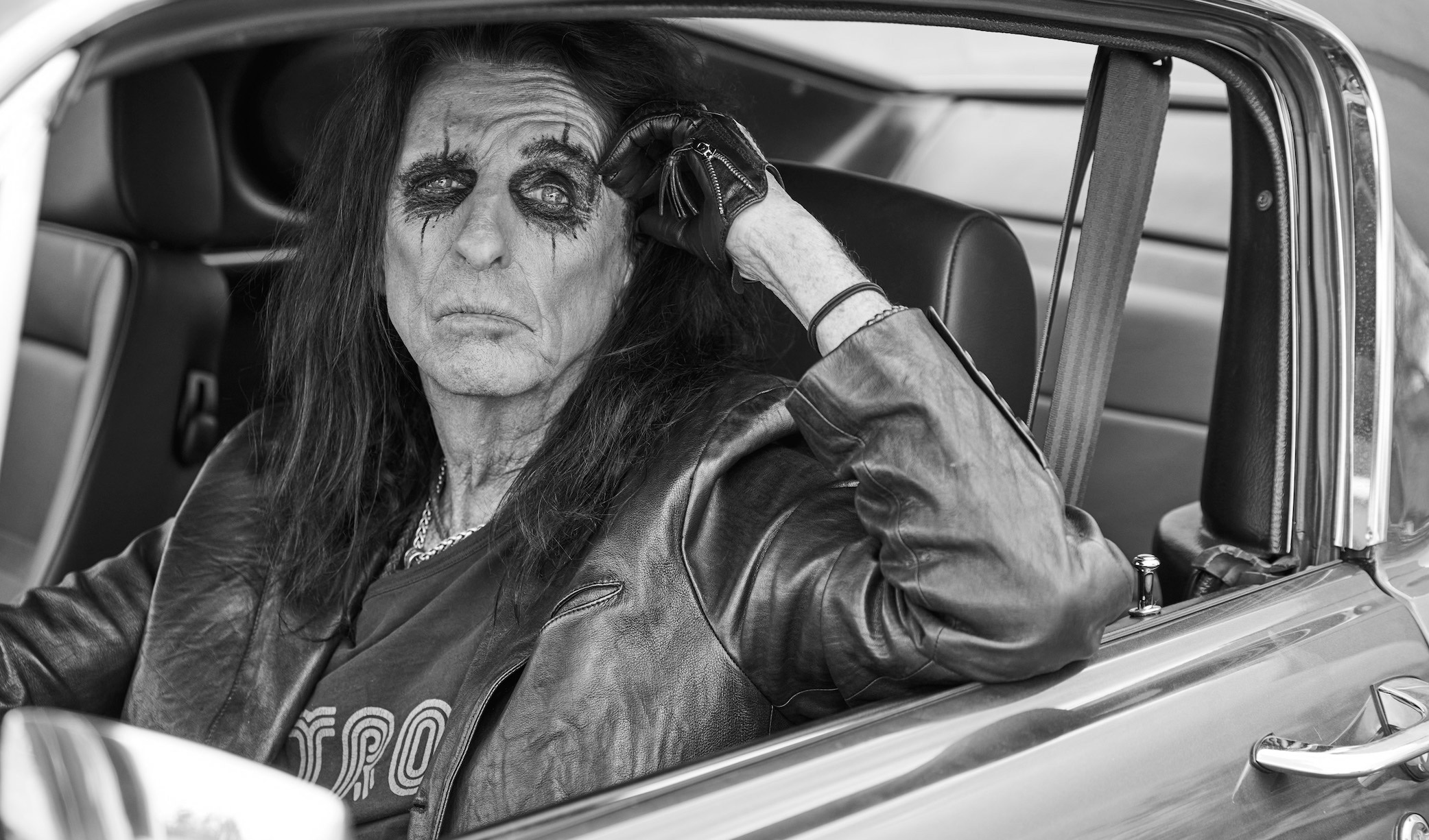48 years can be a long time—just ask Alice Cooper. Before his latest album Detroit Stories topped Billboard’s Album Sales Chart the week after it came out on February 26, the last time it happened to the rocker was when his landmark album Billion Dollar Babies hit the masses near the same date in 1973. This new record is both a tribute to his hometown and the music that put The Motor City on the map during the ’60s and ’70s. Cooper is joined by an all-star cast of Detroit musicians including Wayne Kramer from The MC5, Johnny “Bee” Badanjek from Mitch Ryder & The Detroit Wheels, Paul Randolph, The Motor City Horns, with his longtime collaborator Bob Ezrin handling the production. It’s a testament to how, as the decades have rolled by, the originator of shock rock has still got it.
Cooper and I had a conversation about getting some legendary musicians together for the album, being wowed upon discovering by The MC5 and Iggy & the Stooges, mingling with Motown artists, how today’s musicians can learn from The Beatles, and the music he’s working on now.
Detroit Stories features a hodgepodge of old school Detroit rock musicians. Is this album something you’ve all been talking about doing for a while, or was this an idea that you pitched to each of them?
Bob Ezrin and I wanted to record thirteen or fourteen rock gems, stuff that can be played on the radio. We thought about Nashville, but we didn’t want to go there to do it, same with Los Angeles. Then Detroit came to mind, and initially there was no concept to the album—Bob and I [have been] conceptual on every one we’ve done together. We then said, “OK, we’ll go to Detroit. Let’s write it there, let’s record it there, and let’s use all Detroit players.”
It’s interesting for me because I’ve got such security with all my guitar players and bass players, and my stage band is so good it’s ridiculous. I thought that if we could get Johnny “Bee” and Wayne, those two guys are Detroit. They are walking embodiments of Detroit—everything about them is Detroit, and right there you got the guts of the band. It would have been a crime to not do these songs live in the studio, because the band was so good that we couldn’t layer anything, we just had to let them play.
Would you say that this is sort of a musical love letter to the Detroit scene during the ’60s and ’70s?
I was born in Detroit, so it’s in my DNA, and I left there when I was ten to go to Arizona. I had asthma and I had to get out of that cold, wet climate. After the band went to LA, we worked with Frank Zappa and we just went nowhere. We didn’t belong in Los Angeles, everybody was about peace and love, and we were Clockwork Orange, so we didn’t fit anywhere.
“It would have been a crime to not do these songs live in the studio, because the band was so good that we couldn’t layer anything, we just had to let them play.”
My manager then goes, “We got a gig in Detroit, the first place that gives us a standing ovation we’re moving to.” I said OK, and we got to Detroit for this big pop festival, and I had never heard of bands like The MC5 and Iggy & the Stooges—they weren’t national bands, they were local bands. We got there and I saw The MC5 and I was like, “Woah!” You never saw bands like them in LA, and I thought they were great. Then I saw The Stooges and I went, “What the hell is this? This guy is great!” This was before the word “punk” ever came out. Iggy’s the absolute king of punk, and I’ve never seen anyone more of a punk than him with his shirt off, being a contortionist.
Then we went on, and we were more in-your-face than both of those bands. We were louder, we were more aggressive, we were unapologetic for what we were doing, and the audience loved it. Then they found out I was from Detroit, so I was the long lost son, and we immediately became best friends with all those musicians like Bob Seger, Ted Nugent, and Suzi Quatro. We just fit in there like the scene was made for us, and every weekend we were playing the Eastown Theatre or the Grande Ballroom with all these bands. We were having the time of our lives even though we weren’t making any money. That’s when we met Bob Ezrin, and that’s when we did Love It to Death, which I still consider to be the first Alice Cooper album, and “I’m Eighteen” became a hit and we became a national band.

Detroit was always on its own by being dirtier and grittier with this amplified rock music from you guys, The Stooges, The MC5, and others. At the same time, you also had Motown and the golden age of soul and R&B really popping off.
That time was so crazy. The thing about it was that we were really good friends with the Motown guys. There was no color in Detroit when it came to music. We’d be up there on stage playing with Mitch Ryder or whoever it was, and Smokey Robinson would be down in the audience with a couple of The Supremes and a few of The Temptations. They would come to the hard rock shows because they just dug the energy from the music. Then it was nothing to see guys like us in a room watching all of the Motown bands. People wouldn’t even look at us strangely, they would say, “Oh, it’s just music.”
Iggy Pop is a wild man, and you and the band had chickens on stage. Do you think that element of danger and unpredictability in rock music is something that’s lost today?
Yeah, I think there’s an extreme lack of outlaw in rock and roll. With that being said, here’s the good news: Years ago you couldn’t look at the Grammys without seeing a bunch of rock and roll bands, we were the pinnacle of music. I gotta be honest with you—and I get in trouble for this all the time—I can’t call what I’m hearing these days rock and roll. What I’m hearing is Vegas, I’m hearing young adult music, but it’s not rock and roll.
“I think rock bands are going to start developing this angry, teenage attitude where they’re going to play their music no matter what you think. That’s what rock needs, it needs that attitude again of ‘we don’t care what the charts are doing, this is our music.’”
Foo Fighters, Green Day, Aerosmith, and The Stones are all rock and roll. AC/DC, Guns n’ Roses, those are the rock and roll bands, and there’s a ton of young ones out there. If you ever listen to Little Steven’s Underground Garage, there are tons of young rock and roll bands that are pretty cool little bands. There’s a few that are starting to really make it, like The Strokes, and there’s a band called The Strypes that I think is one of the best bands I’ve ever heard. Now rock and roll is on the outside looking in, and that’s a good place for rock to be.
I think rock bands are going to start developing this angry, teenage attitude where they’re going to play their music no matter what you think. That’s what rock needs, it needs that attitude again of “we don’t care what the charts are doing, this is our music.” I think we’re going to see another resurgence of young rock bands, I just hope they’ll work more on songwriting rather than “here’s a guitar riff, here’s a drum beat, and I’m going to yell at you for ten minutes.” I wish they’ll go back and listen to The Beatles and write a song that’s angry—but it’s going to be a song, it’s not just going to be a riff.
What made Kurt Cobain so great was that he was in a scene in Seattle where if you were a fan of The Beatles you were kind of looked down upon, but he was very influenced by the songwriting of John Lennon and Paul McCartney and he incorporated that into his own craft.
There’s certain songs when I drive around in the car that I stop the car and go, “What was that?” “Been Caught Stealing” by Jane’s Addiction and The Knack’s “My Sharona,” which is probably the best riff I ever heard in my life. When I first heard Jack White I just went, “What?!” Everything he’s doing is against everything that makes a single a hit, and yet it works, and it sounds great. That guy is a true Frank Zappa–ish kind of character.
Other than working on Detroit Stories, what have you been doing to pass time during the pandemic? Have you been able to do a lot of golfing?
Yeah, every morning I go out and play some golf. The weather is never bad where I’m at in Arizona so I play at least eighteen holes a day. I’ve also been doing a ton of Zooms and a ton of these Cameos. We also didn’t expect the album to go number one in the first week, so now there’s an avalanche of media coverage we’re getting, which is great.
I’m actually working on two albums right now, entirely different ones. I’ve been home collecting lyrics, collecting music, and I know all the guys in all the bands are writing. At some point we’re all going to get together with Ezrin and go through a hundred songs. The ones that are naturals, they’re not trying to force a square peg into a round hole, they’re the ones that are gonna happen. It’s always the ones that are the easiest to get into the studio to write, the simplest ones, that are the most powerful. I’m going to listen to see which ones get me excited, same with Bob, and those are the songs that are going to be recorded. Those are the ones that everybody ends up loving the best. FL









